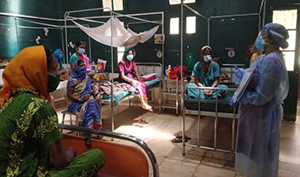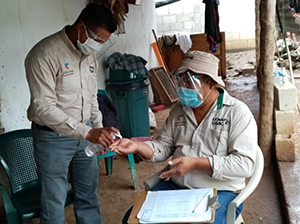The COVID-19 pandemic has transformed the world around us and highlights the need for continued innovation in health care delivery. TDR/SIHI conducted a survey of 40 community-engaged social innovations in health, which found that more than 90% of respondents have been engaged in the COVID-19 response effort and have collaborated with health system actors such as governments, academia and communities to do so.
The Social Innovation in Health Initiative (SIHI) is a network of partner institutions sharing a common goal to advance social innovation in health through research, capacity building and advocacy, to accelerate progress toward universal health coverage and meet the Sustainable Development Goals. Since 2014, SIHI has identified and studied more than 40 community-engaged social innovations in health across 17 countries that are transforming health care delivery to improve access so no-one is left behind.
Between July and August this year, the 40 social innovations were invited to participate in a survey to better understand their engagement in the response to COVID-19. Below are some key findings:
- 29 responded to the survey (73% response rate) of which 55% were women.
- Respondents were from 14 different countries in Africa (15 respondents, 52%), Asia (9, 31%), Latin America (2, 7%) and regional locations serving various LMICs (3, 10%).
- 27 (93% of respondents) have been involved in the COVID-19 response, and 26 (90% of respondents) collaborated with health system actors such as governments, academia and communities in their response to COVID-19.
Four key enabling factors were identified:
- The trust that innovations have developed with communities during their inception was key to raise awareness effectively.
- Social innovations are by nature adaptive to new situations.
- Social innovations have continued to provide health care to patients for diseases other than COVID-19.
- Research has guided their COVID-19 response strategies.
Below are two examples of social innovations that have proactively engaged in the COVID-19 response effort.
Noora Health (Bangladesh and India)
The innovation: Turning hospitals and waiting rooms into classrooms, Noora Health ensures patients’ families are equipped as caregivers to ease the transition from hospital to home. Noora Health was identified by the SIHI South Africa research hub, which conducted a case study on the innovation. |  |
Engagement with response to COVID-19:
Noora Health has developed and rapidly deployed culturally and contextually relevant content (video, digital, audio and print) to facilitate awareness and behaviour change relevant to COVID-19. The content is underpinned by World Health Organization (WHO) and local government guidelines, is available in 12 regional languages and covers 16 key topics.
The spread of COVID-19 highlights that supporting families to care for their patients is more important than ever before, and Noora’s model of empowering both families and patients is uniquely placed to drive this idea forward in other low- and middle-income countries.
- Shahed Alam, President and Co-Founder, Noora Health
In partnership with the Government of Maharashtra, Noora Health is also providing tele-training for COVID-19 patients and families caring for them in order to support recovery at home.
To date, Noora Health has reached over 12 million people in India and Bangladesh and has partnered with more than 60 organizations as well as six central, state, and local government departments. Research through surveys of more than 6000 community members and health care workers has also informed product and content development.
Eco-Health (Guatemala)
The innovation: To prevent Chagas disease, Eco-Health aims to improve the design of homes to reduce parasite transmission and trains leaders and other members of the community to repair and improve their own homes. Eco-Health was identified by the SIHI research hub serving the Latin American and Caribbean region, which conducted a case study on the innovation. |  |
Engagement with response to COVID-19:
This experience Illustrates the importance of trust and the successful continuity in addressing both Chagas and COVID-19.
- Carlota Monroy, entomologist, Universidad de San Carlos de Guatemala
The communities have improved their homes using local materials with the help of Eco-Health facilitators. The same personnel have visited the communities to talk about prevention of COVID-19. Since they had already gained the trust of these communities, this helped with acceptance and implementation of the prevention measures.
These social innovators in health are seizing this challenging period as an opportunity to adapt their models to the COVID-19 context and serving as bridges between communities, the private sector and governments.
They are well placed to respond to the COVID-19 and future health emergencies thanks to the trust that they have established with communities and their role in enhancing primary health care in collaboration with health system actors. This short survey may help identify areas of research to support and build upon these experiences and to strengthen responses to future emergencies.
Separately, as part of a series of SIHI digital events on “Creating an enabling environment for social innovation in health,” an online webinar on “Social Innovation response to emergencies” took place on 9 September. The event showcased examples of the social innovations in health that SIHI has studied to learn about how these are helping to curb COVID-19 and could potentially adapt to respond to future health emergencies. A panel of innovators, government representatives, researchers and foundations discussed good practice and shared lessons learned. A video of the full panel can be viewed here.
For more information, please contact Dr Beatrice Halpaap.
| SIHI is supported by TDR and additional funding is provided by the Swedish International Development Cooperation Agency (Sida). SIHI is supported by TDR and additional funding is provided by the Swedish International Development Cooperation Agency (Sida). |  |


